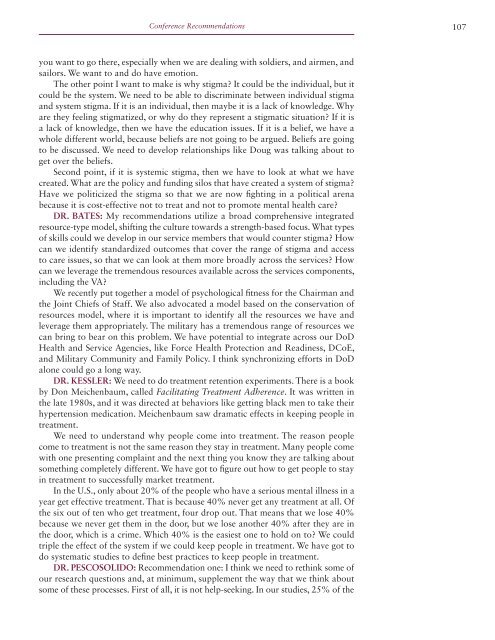stigma and barriers to care - Uniformed Services University of the ...
stigma and barriers to care - Uniformed Services University of the ...
stigma and barriers to care - Uniformed Services University of the ...
You also want an ePaper? Increase the reach of your titles
YUMPU automatically turns print PDFs into web optimized ePapers that Google loves.
Conference Recommendations 107<br />
you want <strong>to</strong> go <strong>the</strong>re, especially when we are dealing with soldiers, <strong>and</strong> airmen, <strong>and</strong><br />
sailors. We want <strong>to</strong> <strong>and</strong> do have emotion.<br />
The o<strong>the</strong>r point I want <strong>to</strong> make is why <strong>stigma</strong> It could be <strong>the</strong> individual, but it<br />
could be <strong>the</strong> system. We need <strong>to</strong> be able <strong>to</strong> discriminate between individual <strong>stigma</strong><br />
<strong>and</strong> system <strong>stigma</strong>. If it is an individual, <strong>the</strong>n maybe it is a lack <strong>of</strong> knowledge. Why<br />
are <strong>the</strong>y feeling <strong>stigma</strong>tized, or why do <strong>the</strong>y represent a <strong>stigma</strong>tic situation If it is<br />
a lack <strong>of</strong> knowledge, <strong>the</strong>n we have <strong>the</strong> education issues. If it is a belief, we have a<br />
whole different world, because beliefs are not going <strong>to</strong> be argued. Beliefs are going<br />
<strong>to</strong> be discussed. We need <strong>to</strong> develop relationships like Doug was talking about <strong>to</strong><br />
get over <strong>the</strong> beliefs.<br />
Second point, if it is systemic <strong>stigma</strong>, <strong>the</strong>n we have <strong>to</strong> look at what we have<br />
created. What are <strong>the</strong> policy <strong>and</strong> funding silos that have created a system <strong>of</strong> <strong>stigma</strong><br />
Have we politicized <strong>the</strong> <strong>stigma</strong> so that we are now fighting in a political arena<br />
because it is cost-effective not <strong>to</strong> treat <strong>and</strong> not <strong>to</strong> promote mental health <strong>care</strong><br />
DR. BATES: My recommendations utilize a broad comprehensive integrated<br />
resource-type model, shifting <strong>the</strong> culture <strong>to</strong>wards a strength-based focus. What types<br />
<strong>of</strong> skills could we develop in our service members that would counter <strong>stigma</strong> How<br />
can we identify st<strong>and</strong>ardized outcomes that cover <strong>the</strong> range <strong>of</strong> <strong>stigma</strong> <strong>and</strong> access<br />
<strong>to</strong> <strong>care</strong> issues, so that we can look at <strong>the</strong>m more broadly across <strong>the</strong> services How<br />
can we leverage <strong>the</strong> tremendous resources available across <strong>the</strong> services components,<br />
including <strong>the</strong> VA<br />
We recently put <strong>to</strong>ge<strong>the</strong>r a model <strong>of</strong> psychological fitness for <strong>the</strong> Chairman <strong>and</strong><br />
<strong>the</strong> Joint Chiefs <strong>of</strong> Staff. We also advocated a model based on <strong>the</strong> conservation <strong>of</strong><br />
resources model, where it is important <strong>to</strong> identify all <strong>the</strong> resources we have <strong>and</strong><br />
leverage <strong>the</strong>m appropriately. The military has a tremendous range <strong>of</strong> resources we<br />
can bring <strong>to</strong> bear on this problem. We have potential <strong>to</strong> integrate across our DoD<br />
Health <strong>and</strong> Service Agencies, like Force Health Protection <strong>and</strong> Readiness, DCoE,<br />
<strong>and</strong> Military Community <strong>and</strong> Family Policy. I think synchronizing efforts in DoD<br />
alone could go a long way.<br />
DR. KESSLER: We need <strong>to</strong> do treatment retention experiments. There is a book<br />
by Don Meichenbaum, called Facilitating Treatment Adherence. It was written in<br />
<strong>the</strong> late 1980s, <strong>and</strong> it was directed at behaviors like getting black men <strong>to</strong> take <strong>the</strong>ir<br />
hypertension medication. Meichenbaum saw dramatic effects in keeping people in<br />
treatment.<br />
We need <strong>to</strong> underst<strong>and</strong> why people come in<strong>to</strong> treatment. The reason people<br />
come <strong>to</strong> treatment is not <strong>the</strong> same reason <strong>the</strong>y stay in treatment. Many people come<br />
with one presenting complaint <strong>and</strong> <strong>the</strong> next thing you know <strong>the</strong>y are talking about<br />
something completely different. We have got <strong>to</strong> figure out how <strong>to</strong> get people <strong>to</strong> stay<br />
in treatment <strong>to</strong> successfully market treatment.<br />
In <strong>the</strong> U.S., only about 20% <strong>of</strong> <strong>the</strong> people who have a serious mental illness in a<br />
year get effective treatment. That is because 40% never get any treatment at all. Of<br />
<strong>the</strong> six out <strong>of</strong> ten who get treatment, four drop out. That means that we lose 40%<br />
because we never get <strong>the</strong>m in <strong>the</strong> door, but we lose ano<strong>the</strong>r 40% after <strong>the</strong>y are in<br />
<strong>the</strong> door, which is a crime. Which 40% is <strong>the</strong> easiest one <strong>to</strong> hold on <strong>to</strong> We could<br />
triple <strong>the</strong> effect <strong>of</strong> <strong>the</strong> system if we could keep people in treatment. We have got <strong>to</strong><br />
do systematic studies <strong>to</strong> define best practices <strong>to</strong> keep people in treatment.<br />
DR. PESCOSOLIDO: Recommendation one: I think we need <strong>to</strong> rethink some <strong>of</strong><br />
our research questions <strong>and</strong>, at minimum, supplement <strong>the</strong> way that we think about<br />
some <strong>of</strong> <strong>the</strong>se processes. First <strong>of</strong> all, it is not help-seeking. In our studies, 25% <strong>of</strong> <strong>the</strong>




